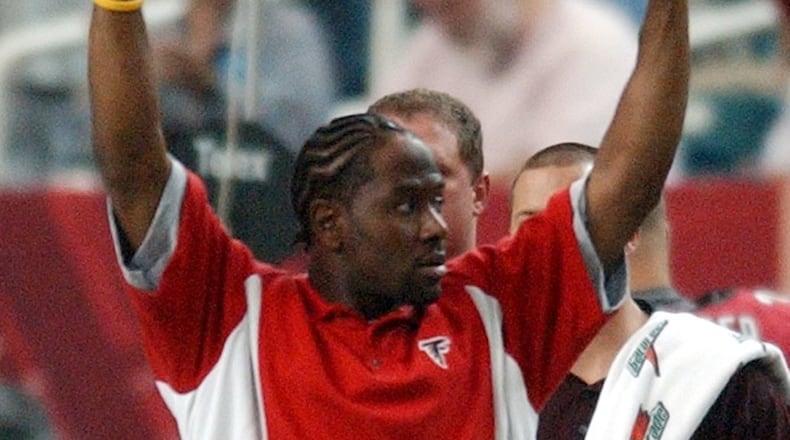Keion Carpenter, a former Atlanta Falcons safety, passed away December 29 in what has been described by a family spokesperson a “freak accident.”
While vacationing with his family in Florida, Carpenter fell down and hit his head causing him to fall into a coma. He died at Jackson South Community Hospital in Miami 24 hours later. Carpenter’s cousin told the Baltimore Sun that he and his son “were running to the car when [Carpenter] slipped, fell, hit his head and slipped into a coma.” He added, “It was just a freak accident. He was always healthy; he went to the doctor, ate well and worked out.”
Carpenter’s professional football career started with the Buffalo Bills in 1999 and ended with the Atlanta Falcons 2005. In the days since his untimely death, much has been said about his football career, but it’s been Carpenter’s altruism and his “heart of gold” that has marked his legacy.
“Keion was one of the rocks around which we built our program at Virginia Tech in the 1990s,” former Virginia Tech Coach Frank Beamer said in a statement after the death. “He was a tenacious punt blocker and a relentless player on defense. More importantly, he had a heart of gold. His work with The Carpenter House and other charitable organizations to help those in need truly embodied the Virginia Tech spirit.”
According to Bleacher Report, Carpenter played for the Hokies for 3 years (1995-98) and made an appearance in 11 games each season: “He tallied 10 career interceptions—five during his senior campaign—and ran two of those picks back for touchdowns. He was also a special teams contributor as a punt and kick returner. He appeared in 83 career games and notched 14 interceptions during his time with the Falcons and Bills.”
In 2003, Carpenter injured his spine during a collision on field while playing for the Falcons. He was among a small number of NFL players who successfully returned to play football after experiencing spinal fusion surgery. He retired in 2005.
When he retired, Carpenter established The Carpenter House—a charitable organization, near his home city of Baltimore that aims to “strengthen and empower families from disadvantaged backgrounds.” He also donated his time locally to other programs, such as coaching aspiring young football players and sought to teaching players how to avoid concussions.
“He made sure he took care of his own,” Chris Draft, a former teammate of Carpenter’s, told the AJC. Through his actions, Carpenter reaffirmed for Draft that it is possible to rise above the expectations in any arena. “You can play this game, and be a man playing this game, and take care of your community,” he said.
Aaron Maybin, a former NFL player, published a remembrance in the Baltimore Sun about the influence Carpenter, his mentor, had on his life. In his youth, Maybin believed his future NFL success would get him the million-dollar payday he needed to fix the problems of his hometown. Maybin recalled words he’ll “never forget” that Carpenter told him: “You might think that this check you got coming is enough to change the world bro, I been there. But what you need to change the world isn’t money, it’s what God put in your heart already. … That’s all you need.”
Maybin later helped Carpenter co-found Shutdown Academy, a program within The Carpenter House that provided instruction and mentoring from academics to athletics. “We’re going to do all we can to keep his legacy alive,” Maybin told the Baltimore Sun.
Draft spoke of opportunities that Carpenter helped create that “really made a difference” in a community like Baltimore, whiich has experienced a great deal of turmoil in the past couple of years. He had opportunities to meet some of the lives Carpenter had touched and was amazed to see “the people who he’s touched and that love and care about him.” He was happy, he said, to see that love reciprocated by the community.
“He understood how to play the game,” Draft said. “He really understood that sometimes you’re not going to start where you want to be, but as long as you’re willing to put the work in, you can move up.”
Saddened by the unfortunate circumstances surrounding Carpenter’s demise, and the uncertainty of life, Draft finds a silver lining in an affirmation to live life fully—as Carpenter exemplified.
“You don’t know when it could be your last day,” he said. “It’s a reminder to live.”
About the Author
The Latest
Featured

